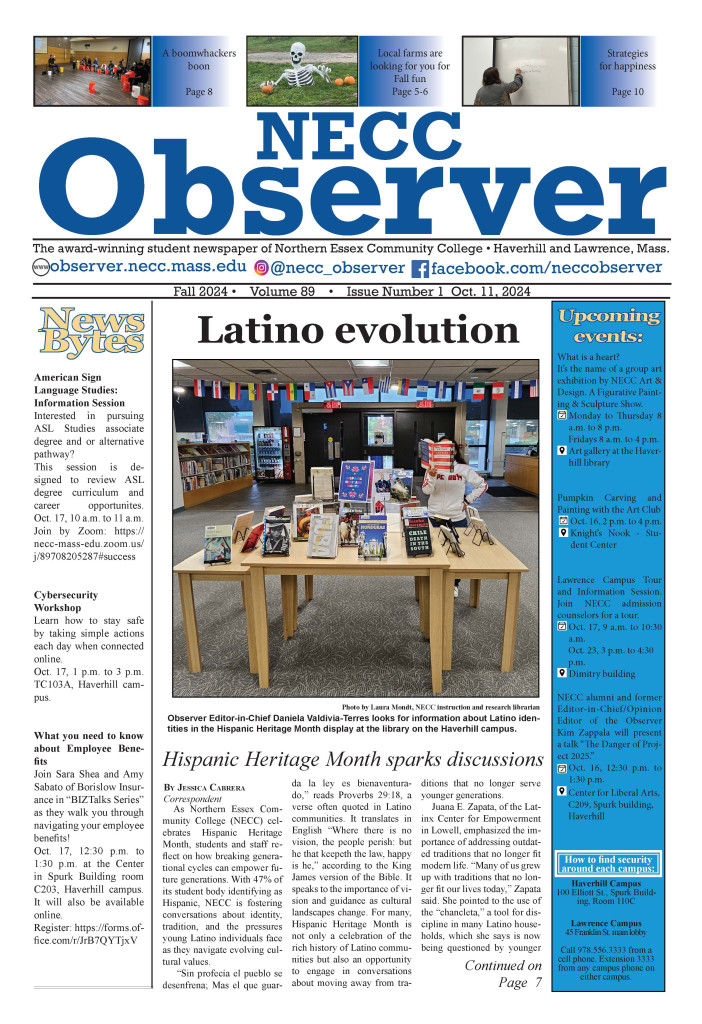The NECC Library is hosting a continuing series of workshops to help students define, identify and avoid plagiarism when completing assignments. One workshop was held on April 11.
Susan Leonardi, an Instruction and Research Librarian at Northern Essex hosted a zoom call and discussed the importance of the use of resources that NECC offers.
The main goals and purpose of the presentation on how to avoid plagiarism are to locate and use the links NECC offers, be able to define plagiarism and what it means in the United States, especially at NECC, learn how to work around plagiarism whether intentionally or unintentionally done, and identifying the departments on campus that can help you detect and avoid plagiarism.
What is plagiarism? Everyone has heard the term most of their educational careers and to be wary of it. The definition is the practice of taking someone else’s work or ideas and passing them off as one’s own.
Northern Essex’s definition is “the use of any other person’s research, images, words or ideas as though they were your own, without giving appropriate credit to the original source.”
Plagiarism is a form of academic dishonesty — completely disrespecting the integrity of someone’s work whether it be an essay, a photo, or art.
Instructors are required to provide students with a clearly written definition of plagiarism in their course syllabus. Students are responsible for understanding what plagiarism is in each of their classes.
Avoiding plagiarism takes time management, writing strategies and citing!
“Our library sources offer you the tools to source your essays without needing google,” says Leonardi.
More often than not students discover the tools NECC offers later finding regret in wishing they knew sooner they could have used them making writing an essay or research project much easier. These tools are closer than you think if you enter necc.mass.libguides.com. The NECC library offers various ways to help, down to even choosing an essay topic if you struggle with that. Essentially you are offered research. An example of some of the tools this site offers is a Citation Guide:Help with APA, MLA, Chicago, Integrating Sources Into Your Paper. Offering handouts and worksheets, citation managers too. You can even chat with a live NECC librarian helping you with how to maneuver the site and how you may look for certain information in regards to your research.
Making a visit to the tutoring and writing center is something that Leonardi also often recommends to students. You can make a visit on either campus, make an appointment and ask for the help you need.
NECC works tremendously hard on making sure their students have all the tools to succeed in their future, education, and careers. You can always book an appointment on Navigate as well.
In regards to plagiarism and questions students may be wondering, the reporter asked Leonardi’s thoughts on the future of education in regards to online sites available to students like chat.gpt, grammarly, and cliffnotes, quizlet, google and the internet in general, Leonardi soon dove into how it may be a structural problem within our education system for students to find the need to have to copy answers to their essays and research.
This could mean that it may not be the student’s fault, nor the teachers, but the curriculum.
With students finding the need to cheat there are many factors in place as to why. This could range from whether a culture of cheating is normalized after solely learning online or students being fundamentally dishonest or unmotivated, to students being under high pressure who are overwhelmed by their academic and outside life workload, to universities needing to reevaluate students’ academic work loads, etc.
Though the future of education will always be a discussion on how to work around our adapting society with adapting technology. Leonardi says “Our library offers great tools that copy and pasting from google can’t always do for students sometimes. When they need to cite their sources and doing so in the correct format …l like an encyclopedia it covers a vast amount of information, it can offer you ideas going into research topics if you are having trouble starting out…it is sort of the researcher starter kit for students.”
Skills like distinguishing between opinion and analysis and avoiding vague generalities as well as focusing on a core theme for your paper are all that Leonardi believes take practice through time as a developing student taking on assignments.
“I would say that there are so many places and people you can look to for help like the writing center, your professors, librarians, are always here to help. Don’t ever be afraid to ask questions,”

